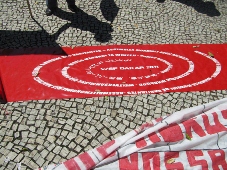 The City is for All has joined the declaration signed by many housing rights organizations in February, 2011 in Dakar, Senegal.
The City is for All has joined the declaration signed by many housing rights organizations in February, 2011 in Dakar, Senegal.
In the last ten years, articulations and convergences between activists, social movements, inhabitants´ and neighbourhood organizations as well as technical supports that defend the right to habitat have been consolidated.
Findings:
We gather around the struggle for the realization of Economic, Social, and Cultural Rights (ESCR) that are fundamental in defending the structural place of the family, rural and urban communities, and coexistence based on the inclusion of all people. We refer to the ESCR that are related
to habitat and which correspond to state obligations related to housing, water and sanitation, education, health and citizen participation. These are the legal basis for demanding collective rights to land, natural resources, livelihoods, energy, transportation and recreation, and especially the right to the city, food sovereignty and climate justice. Due to the close relationship with the family, home, neighbourhood, village and public space, women are principle protagonists in local struggles to defend the right to habitat. Women, as well as children, disabled people, the evicted, homeless, nomads, refugees and migrants are the main people excluded from these rights and therefore must be recognized and their rights defended in all of these struggles.
The obstacles towards realizing the right to habitat are multiplied throughout the world, regardless of local cultural differences. Therefore, it is our duty to denounce real estate and land speculation practices that threaten the land of the poorest, most disadvantaged and vulnerable populations with land grabbing, destruction of neighbourhoods and villages, gentrification of long-standing neighbourhoods, rising rents compared with the stagnation of incomes, mega-project and mega-event planning and development which violate the right of communities to remain in their traditional homes, armed conflicts and occupied territories, "natural" disasters, and the effects of climate change which provoke floods, landslides and water, air and soil pollution. All of these territorial phenomena generate mass forced evictions, increasingly affecting rural and urban populations throughout the world.
Proposals:
We, local, national, regional, continental and global organizations gathered here in the process of building the World Assembly of Inhabitants, pledge to continue united in building solidarity, so that all people may have the right to live in peace and with dignity in the countryside and in the city.
We also commit to participate in the Global Campaign for the Right to Habitat, held yearly on the first Monday of October.
On October 3, 2011 and October 1, 2012, the themes that will bring us together around the world are: (i) the causes and effects of forced evictions, the suffering and impoverishment of people affected by rural and urban habitat problems; and (ii) solidarity with activists for the right to habitat who have been victimized by repression and violence against their civil and political rights.
The annual campaign for the right to habitat will be organized in an inclusive and diverse manner, coordinated by all those involved in habitat struggles throughout the world by means of marches, protests, demonstrations, occupations, and public debates and meetings, among other expressions. The circulation of the campaign will be done primarily by social networks through the internet, and will also be publicized on the websites of the social movements, networks and organizations engaged in the campaign.
To meet these commitments, organizations and networks are constituting a Liaison Committee that is committed to agreeing on a platform and a plan of action that are the result of meetings organized by the inhabitants organisations in the popular neighborhoods and at the university campus in the framework of the WSF Dakar, to render concrete the solidarity to fight against the violations of rights that are rooted in common causes around the world.
In the last ten years, articulations and convergences between activists, social movements, inhabitants´ and neighbourhood organizations as well as technical supports that defend the right to habitat have been consolidated.
Findings:
We gather around the struggle for the realization of Economic, Social, and Cultural Rights (ESCR) that are fundamental in defending the structural place of the family, rural and urban communities, and coexistence based on the inclusion of all people. We refer to the ESCR that are related
to habitat and which correspond to state obligations related to housing, water and sanitation, education, health and citizen participation. These are the legal basis for demanding collective rights to land, natural resources, livelihoods, energy, transportation and recreation, and especially the right to the city, food sovereignty and climate justice. Due to the close relationship with the family, home, neighbourhood, village and public space, women are principle protagonists in local struggles to defend the right to habitat. Women, as well as children, disabled people, the evicted, homeless, nomads, refugees and migrants are the main people excluded from these rights and therefore must be recognized and their rights defended in all of these struggles.
The obstacles towards realizing the right to habitat are multiplied throughout the world, regardless of local cultural differences. Therefore, it is our duty to denounce real estate and land speculation practices that threaten the land of the poorest, most disadvantaged and vulnerable populations with land grabbing, destruction of neighbourhoods and villages, gentrification of long-standing neighbourhoods, rising rents compared with the stagnation of incomes, mega-project and mega-event planning and development which violate the right of communities to remain in their traditional homes, armed conflicts and occupied territories, "natural" disasters, and the effects of climate change which provoke floods, landslides and water, air and soil pollution. All of these territorial phenomena generate mass forced evictions, increasingly affecting rural and urban populations throughout the world.
Proposals:
We, local, national, regional, continental and global organizations gathered here in the process of building the World Assembly of Inhabitants, pledge to continue united in building solidarity, so that all people may have the right to live in peace and with dignity in the countryside and in the city.
We also commit to participate in the Global Campaign for the Right to Habitat, held yearly on the first Monday of October.
On October 3, 2011 and October 1, 2012, the themes that will bring us together around the world are: (i) the causes and effects of forced evictions, the suffering and impoverishment of people affected by rural and urban habitat problems; and (ii) solidarity with activists for the right to habitat who have been victimized by repression and violence against their civil and political rights.
The annual campaign for the right to habitat will be organized in an inclusive and diverse manner, coordinated by all those involved in habitat struggles throughout the world by means of marches, protests, demonstrations, occupations, and public debates and meetings, among other expressions. The circulation of the campaign will be done primarily by social networks through the internet, and will also be publicized on the websites of the social movements, networks and organizations engaged in the campaign.
To meet these commitments, organizations and networks are constituting a Liaison Committee that is committed to agreeing on a platform and a plan of action that are the result of meetings organized by the inhabitants organisations in the popular neighborhoods and at the university campus in the framework of the WSF Dakar, to render concrete the solidarity to fight against the violations of rights that are rooted in common causes around the world.
On February 10, 2011 in Dakar, the following networks and organizations sign this commitment:
International networks :
* Alliance Internationale des Habitants (AIH)
* Coalition Internationale de l'Habitat (HIC)
* Comités Promoteurs de l'Assemblée Mondiale des Habitants international
* Comités Promoteurs de l'Assemblée Mondiale des Habitants Régionaux
* LOCOA - Leaders and Organizers of Community Organization in Asia
* No-Vox
National and local inhabitants organizations:
* ACIDAK Asociation Comité Interbidonville, (Dakar, Senegal)
* AHTB, Association des Habitants et Travailleurs de Baraka (Dakar, Senegal)
* Amandla Centre of Zimbabwe (Zimbabwe)
* Assembly to End Poverty (USA)
* A Város Mindenkié (Hongrie)
* CAES (Paraguay)
* CDV (México)
* CHRA (Zimbabwe)
* Colectivo para el desarrollo del peru de villa maria dl triunfo (Perú)
* Comité de Gestion des Inondations et de Déguerpissement de Médina Goumars (Guédiawaye, Senegal)
* Comités Promoteurs Nationaux de l'Assemblée Mondiale des Habitants Nationaux
* CONAM (Brasil)
* CONAPAMAG (Guatemala)
* Coordination duped investors (Russie)
* Coophabitat (Republica Dominicana)
* Cooperativa de reciclado de villa 31 (Argentina)
* Coopérative Coralli (Italie)
* COORDINADORA DE COLONIAS UNIDAS (México)
* DAL, Droit au Logement (France)
* EMAD, Entente des Mouvements et Associations de Développement (Dakar, Senegal)
* Famemg – Minas Gerais (Brasil)
* FBFF – Ceará (Brasil)
* FEDEVI (Argentina)
* Federación de Cooperativas Todos juntos (Argentina)
* FOVELIC (Perú)
* GIU (Perú)
* Grupo puertorriqueño de solidaridad con la niñez Dominico-Haiana CPNDH (Puerto Rico)
* Mouvement And Soukali Médina Goumars (Dakar, Senegal)
* Movimiento Nuevo Encuentro (Argentina)
* National Tenants Union (Nigeria)
* Omunga (Angola)
* POHDH (Haiti)
* PPEHRC (USA)
* PROUD and National Forum for the Urban Poor (India)
* Red Metropolitana Inquilinos (Venezuela)
* RNHC (Cameroun)
* Shelter for the Poor (Bangladesh)
* Thames Valley Gypsy Council (UK)
* Tenants Union (Russie)
* Tonderai Ndira Housing Cooperative (Zimbabwe)
* UCISV-Ver (México)
* Unione Inquilini (Italie)
* UNION POPULAR VALLE GOMEZ, D.F. (México)
* USA/Canada Alliance of Inhabitants (USACAI)
* Youth governance and environmental programme (Kenya)
Support:
* ABONG, Brazilian Association of NGOs
* AITEC, Association Internationale des Techniciens et Chercheurs (France)
* ALOP, Associación Latinoamericana de Organizaciones de Promoción
* CENCA (Perú)
* CERPAC, Centre de Recherche Populaire pour l´Action Citoyenne(Senegal)
* ENDA-Economie Populaire (Senegal)
* ENDA-Relais pour le Développement Urbain Participé, (Senegal)
* FAL, Forum des Autorités Locales
* Handicap International
* Intermondes (Senegal)
* Plateforme DESC Sénégal – RADI
* WISEEP (Ghana)


